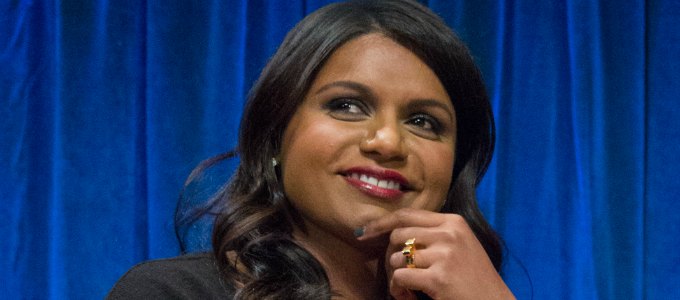
The comedian's brother writes about posing as a black man to get into med school, putting another negative spotlight on affirmative action practices.
by Kellye Whitney
April 10, 2015
The Mindy Project's creator and star doesn't support her brother's book, which details his experience of getting into medical school while masquerading as a black man. (Photo of Kaling courtesy of Wikimedia Commons.)
I feel sorry for Mindy Kaling. Really sorry.
Right now, the actress is probably cursing the fact that she’s not an only child thanks to her brother Vijay Chokal-Ingam, who’s shopping around a book about his experiences as a “hard-partying college frat boy who discovered the seriousness and complexity of America's racial problems while posing as a black man.”
In 1998, as a University of Chicago undergrad, Chokal-Ingam contrived an unusual plan after realizing his grades weren't good enough to get him into med school. He shaved his head, trimmed his eyelashes, adopted the name JoJo and applied anyway — as a black man — and it worked.
Despite a 3.1 college GPA and an OK score of 31 on the Medical College Admission Test, Chokal-Ingam said several top medical schools courted him. He later dropped out of med school after two years, and is now a “professional résumé writer, interview coach and graduate school application consultant,” according to a CNN article.
Some of his experiences ring true to the black experience: “Cops harassed me. Store clerks accused me of shoplifting. Women were either scared of me or couldn't keep their hands off me.”
But here — if you aren’t already rolling your eyes hard enough — is where this pitiful story really goes to hell. He said: “What started as a devious ploy to gain admission to medical school turned into a twisted social experiment.”
Even though there's not much to suggest his being “black,” helped him get into med school — he applied at 22 medical schools, interviewed at 11, was wait-listed at four and got into only one — this story isn’t doing much for anyone attempting to defend affirmation action.
Chokal-Ingam said his story shows how affirmative action “destroys the dreams of millions of Indian-American, Asian American, and white applicants for employment and higher education.”
“It also creates negative stereotypes about the academic abilities and professional skills of African-American and Hispanic professionals, who don't need special assistance in order to compete with other minority groups,” he wrote.
But Saint Louis University spokeswoman Nancy Solomon — that’s the med school he dropped out of — told the Huffington Post race played no part in Chokal-Ingam's admission. “His MCAT scores and science grade point average met SLU’s criteria for admission at that time, and his race or ethnicity did not factor into his acceptance into the University.” And there is no point of comparison because he never applied as himself, an Indian-American.
But given the 2013 Supreme Court ruling that tightened how affirmative action admissions programs are structured, and a 2014 ruling which upheld the University of Michigan’s ban on race in the admissions process, the issue doesn’t need this kind of heat. I wouldn’t be surprised if Chokal-Ingam’s story threw another big, negative spotlight on the issue.
At worst, the guy’s a liar and an opportunist — poor Mindy — and his tale of woe, while not complete crap, misses one fundamental, and in my opinion easily defensible, factor that saves affirmative action: To judge the practice as unfair, everyone being judged would have to start at the exact same place, and minorities very often do not.
That’s the point, the reason that affirmative action exists: to level the playing field and provide opportunity for those who would not be able to step up to the plate at all through no fault of their own, thanks to educational systems that favor some groups over others.
Now, what should happen is, no one should buy this book, and Saint Louis University should prosecute Chokal-Ingam for fraud. But we’ll see what happens.



